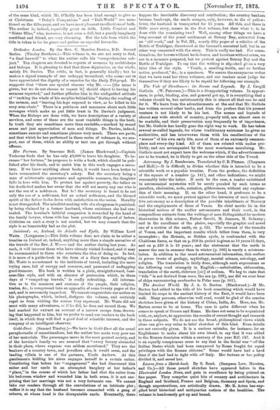Gold-Dust. (Samuel Tinsley.)—We have in Gold-Dust all the usual paraphernalia
of sensationalism, but the anther has made very poor use of her materials. The personages move in the most genteel society, and of the heroine's family we are assured that "every luxury abounded in their place, where expense was seldom mentioned." They are the bankers of a country town, and jewellers also, it would seem, and the leading villain is one of the partners, Uncle Andrew. At this gentleman's bidding his niece engages herself to a certain suitor. Considering that before her " engagement " she had discovered this suitor, and her uncle in an attempted burglary at her father's " place," in the course of which her father had shot the suitor from his bed-room window and wounded him in both arms, it is not sur- prising that her marriage was not a very fortunate one. We cannot take our readers through all the convolutions of an intricate plot ; suffice it to say that the husband becomes connected with a gang of coiner', at whose head is the disreputable uncle. Eventually, there happen the inevitable discovery and retribution ; the country bloke; become bankrupt, the uncle escapes, only, however, to die of yellow- fever, the husband is transported for 15 years. All this, and there is little more story, occurs in the first volume, but then what is to be done with the remaining two ? Well, among other things we have a long account of the penal settlement at Botany Bay, extracted from an"old work," and in Vol. III., nearly fifty pages of a relation of the Battle of Trafalgar, discovered at the baronet's ancestral hall, but in no other way connected with the story. This is really too bad. For sensa- tionalism, for heroes without back-bones, and heroines without sense, we are in a measure prepared, but we protest against Botany Bay and the Battle of Trafalgar. To say that the writing is slip-shod gives a very faint idea of the style. "Youth, a smelling-bottle, and no further notice, produced," &c., is a specimen. We assure the anonymous writer that we have read her three volumes, and our readers must judge for themselves if they are likely to be repaid for following our example.


































 Previous page
Previous page